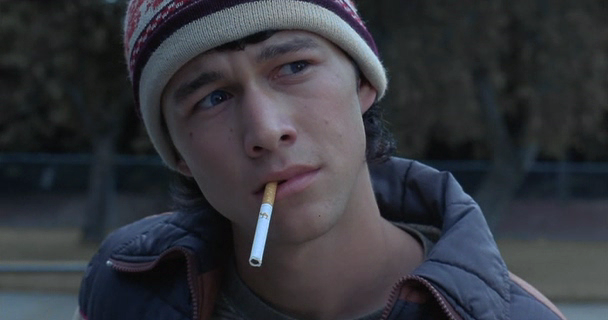Mysterious Skin: Why Gregg Araki’s devastating depiction of childhood sexual abuse remains essential viewing
By Will Stroude

This article first appeared in Attitude issue 281, April 2015.
Much is made of the word “versatile” among gay and bisexual men, but it’s perhaps the best word to describe the films of director Gregg Araki. Prior to 2004, he was known for his anarchically hipster Teen Apocalypse Trilogy, consisting of the psychedelic Totally F***ed Up, The Doom Generation and Nowhere.
Those unfamiliar with Scott Heim’s novel Mysterious Skin were probably expecting Araki’s adaptation to follow the same hedonistic route. If so, they were in for a rude awakening. Bleak and harrowing, the film details how two young men (Joseph Gordon-Levitt and Brady Corbet) react to the same traumatic childhood incident in very different ways. Neil (Gordon-Levitt) runs away from home and funds his drug use through sex work, while Brian (Corbet) firmly believes he was abducted by aliens.
Araki – one of very few bisexual Asian-American directors working in Hollywood – maintains the dream-like, anaesthetised quality of his earlier work but goes straight for ‘the feels’ with Mysterious Skin. As their paths slowly converge, Neil and Brian undergo heart-breaking journeys. The reveal of what happened to the boys as kids isn’t exactly a twist but this makes Brian’s epiphany even sadder because it’s quite apparent to both Neil and the viewer throughout.
One particularly emotional scene features rent boy Neil panic when he sees his client is covered, head to toe, in the tell-tale signs of Kaposi’s sarcoma. Set in the late 1980s, Neil is terrified he will contract Aids, but the elderly gentleman breaks down and confesses he just wants to feel the touch of skin and have Neil hold him. It’s an achingly human moment, almost painful to watch.

Gordon-Levitt in particular is outstanding – not to mention almost impossibly beautiful – as damaged, fragile Neil. For me (and by his own admission) this was the role that successfully lifted him from Third Rock from the Sun into bona fide film star, leading-man status. The film also features Buffy the Vampire Slayer alum Michelle Trachtenberg and the always underrated Elisabeth Shue as Neil’s mother.
Following blanket media coverage of both the Jimmy Savile and the football child-abuse scandals, Mysterious Skin is timely viewing. It’s an exploration of memory, innocence and trauma. It was accused by Australian censors of glamourising paedophilia, but I’m more inclined to agree with critic Roger Ebert, who – despite loathing Araki’s early work – described Mysterious Skin as “the most touching film I have ever seen about child abuse”. Essential watching.
More stories:
It’s official – ‘Sense8’ has been officially cancelled by Netflix
Britney Spears pens heartwarming love letter to the LGBT community
